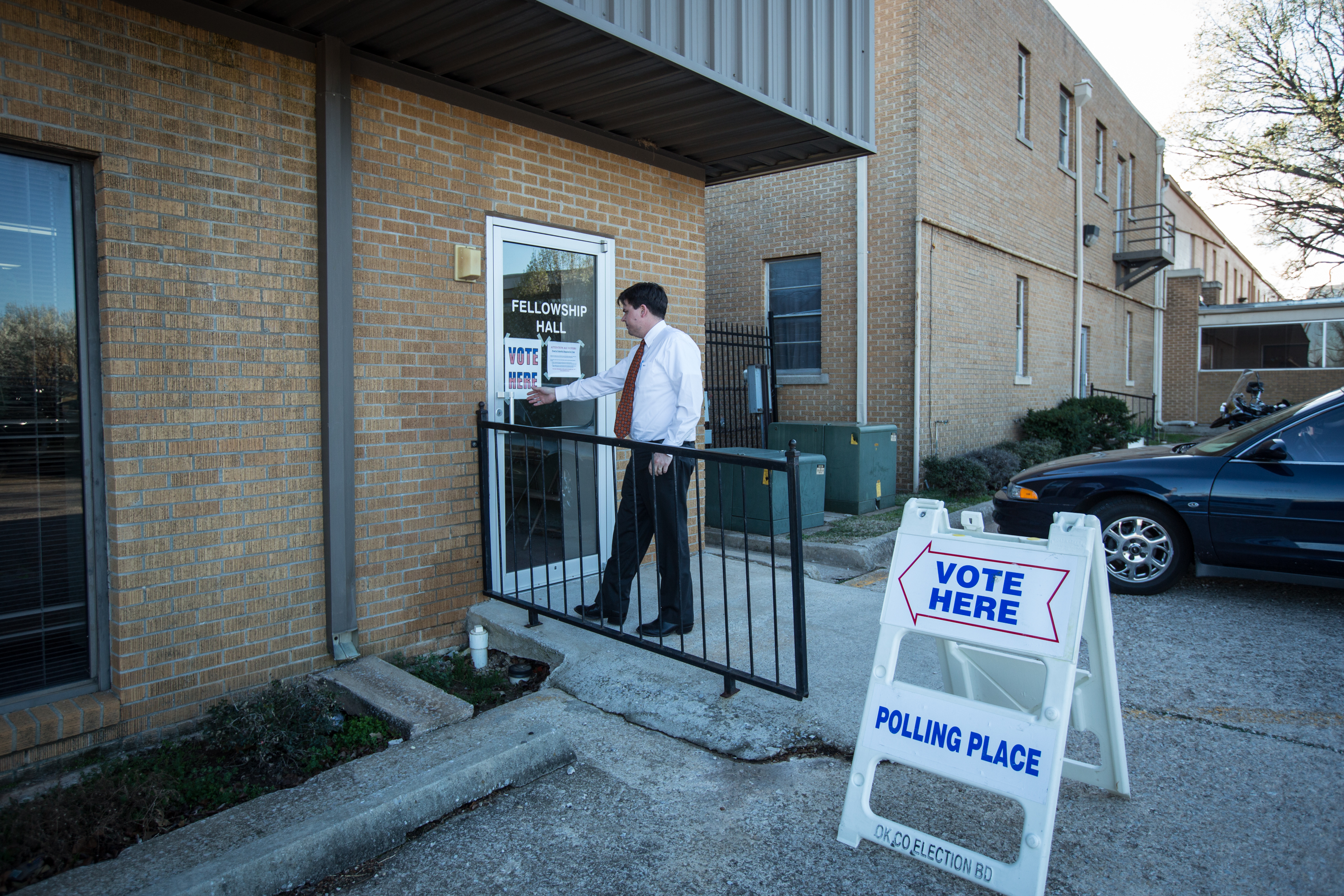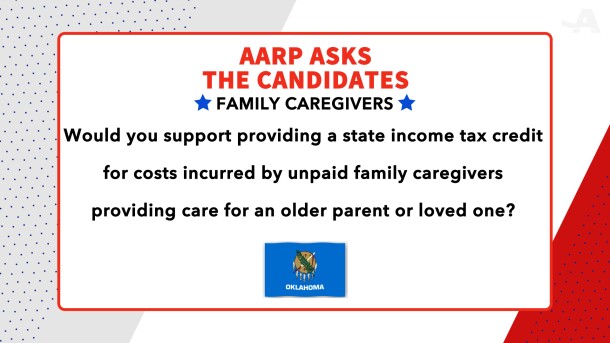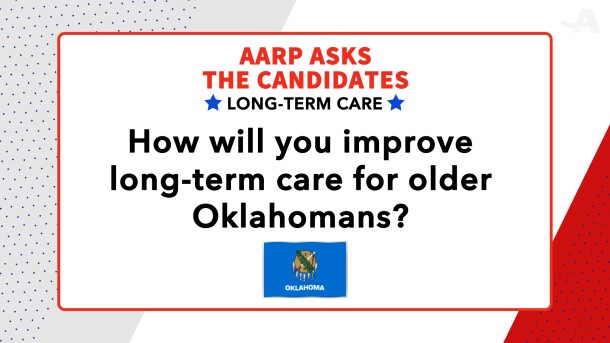AARP Hearing Center

Oklahoma's Nov. 8 election will feature several closely watched races, including the gubernatorial contest between Joy Hofmeister (D) and incumbent Gov. Kevin Stitt (R). AARP Oklahoma spoke with the candidates to see where they stand on key issues for 50-plus voters. Here's what they had to say:
1. Would you support providing a state income tax credit for costs incurred by unpaid family caregivers providing care for an older parent or loved one?

Stitt: Thank you. Thank you for that question. You know, in an ideal world we'll have zero income tax. I cut income tax last year. I also am proposing to remove the grocery tax. So I believe in smaller government, lower taxes as a general rule, and I've got a vision to get our income tax actually to zero over the next decade. We can do that because our economy's so booming, and as we grow, I'll never jeopardize core services, but we have to give that money back to the taxpayers. So, we wanna do that. And then when we think about how do we encourage people through either tax credits or lower taxes for those caregivers, we wanna do whatever we can. There's a lot of programs in Medicaid and my managed care system that actually wants people in their homes versus more expensive coverage in a nursing home. So that's all part of the plan with the managed care program that we just rolled out, which was a heavy lift, to change that model, 'cause sometimes the institutions fight us on changing the model. But it's the right thing to do. Forty-two other states have figured out that with managed care we can actually provide better care and also keep people in their homes. So that's always what we're gonna push for.
Hofmeister: I want to be very, very clear in my desire to lower the kinds of costs that our seniors, but all Oklahomans, are facing. We know there are regressive taxes like the grocery tax, for example. And there are other tax credits that are today available for some of our families. When we look at the tax credits, we need to look at them in the totality of the state tax code, and certainly we need reforms. We have to also look at how one thing impacts everything else. So I am committed to reducing those fees, those costs for many Oklahomans who are supporting and caring for their family member, their mother, their father, their aunt, and also recognize that they have other areas that need relief, to help offset, whether that is the cost of skyrocketing gas prices. And I'm very critical of our governor who has waited too long, while Oklahomans have endured these skyrocketing costs that could have been anticipated. It's important we also look at having, not a permanent solution for a short-term problem, but work with experts, with economists, with the legislature to get things done. And I am against something that would be done in haste that would have unintended consequences. I am committed, though, to working to support families and offset the kind of expenses that they are incurring, taking care of their loved one, which we should be encouraging. And we know that, in the long run, that is something that is going to help our economy overall, and families take care of their loved ones and provide dignity.
2. As governor, what will you do to help improve financial security for older Oklahomans?

Hofmeister: Well, financial security for our seniors in Oklahoma is critical. We know this allows them to be able to stay independent for longer. And there are rising costs when they have fixed incomes that a governor is able to help mitigate. And I'll give you an example. When I talk with Oklahoma seniors around the state, I am hearing them talk about the rising utility rate hikes due to the last storm. And we needed to have a governor who would champion the needs of Oklahoma families. Instead, not just families, but businesses and particularly those families of seniors are on fixed incomes and having to bear the price and the cost of those rate hikes. Over the next 20 years, we will be living with this particular decision that was made. I wanna champion the needs of Oklahoma families. I want to stand with those in communities, in municipalities that need a stronger partnership so that at the state level we can leverage those partnerships and look at how to adjust for inflation, to help remove some of the burden for high costs, again, with prescription drugs or with the ability to have hospitals and nursing homes close to family and to ensure that our seniors have what they need to be able to continue to thrive right there in their own communities. We know that overall this is the best path forward, and we need a governor who will make these connections, work with experts, work with organizations representing the needs and interests of seniors, work with the medical community, and work with those who provide housing that is also affordable and safe. So much work to be done. And I have already spent a lot of work listening and I'm ready to put into action these things that will help adjust for the rising costs that too many seniors and families are facing today.
Stitt: Well, first off, you know, a lot of retirement benefits, state employees, we gave the first time in over a decade, a COLA increase, which is a cost of living increase for retirement benefits for state employees, for our law enforcement. So we're gonna continue to do that. You know, also, I hear from seniors a lot and people on fixed incomes that inflation is really hurting them. And if you think about those policies at the federal government that are causing everything at the gas pump, at the grocery store to cost more, I'm doing two things. I'm really pushing back on this, the Biden administration, on their energy policies. We need an all-of-the-above approach, just like every president of the United States has asked for since 1973. It's an energy independence policy, which I think will help us at the grocery store and the gas pump in Oklahoma. But as governor, I'm trying to protect Oklahomans. And so I'm asking to remove and get rid of the grocery tax. The grocery tax is a regressive tax. In other words, it hurts people on a fixed income way more than people that make a lot of money because you're spending a higher percentage of your income on groceries than people at the top end. We're one of only 13 states that taxes groceries. Ours is one of the highest, and so it makes perfect sense for me. We can afford it because I've been fiscally disciplined with all of our other government that we can do that. And as the economy's growing, we want to eliminate that to actually put about $500 a year back in the average Oklahoman's pocket. So I'm pushing the House and the Senate to get that done next year for us.
3. How will you improve long-term care for older Oklahomans?

Stitt: Yeah, thank you for that question. You know, I was the first governor in 10 years that signed an increase in funding for home care, nursing homes through our Medicaid program. So really excited about that. I actually redid our Medicaid program altogether. It's called Managed Care. Forty-two other states have done this, and it's really holding hospitals, holding providers more accountable for better care for people on Medicaid. So I think that's so important. My opponent actually is saying they want to unwind what we've done. But when we've expanded Medicaid under my administration and we're holding providers more accountable, we're giving them more money for reimbursement rates, then actually we're going to get better care for our citizens. So I think that's so important. We've put another $1.8 billion into our health care system. Because that's exactly what we want as Oklahomans, we want better access to health care. And through my Managed Care program, which my opponent wants to unwind, that actually helps seniors stay in their homes. It helps services to keep people in their homes instead of forcing them into nursing homes. So that's something I hear constantly from all my friends. They want to stay in their homes and be self-sufficient and be independent. But they just need a little help. So we want to make sure that through Medicaid, we actually give them that help to keep them in their homes as long as possible and not force them into some kind of subpar care at a nursing home.
Hofmeister: Well, the access to quality affordable health care is critically important for all Oklahomans, but particularly for seniors. I have spent a lot of time traveling all over this state, and I recently was talking to seniors who were talking about how, of course, they do not feel they have the access or the choices for the kind of care they need. They are talking about the skyrocketing costs of their medications and having to make choices between paying bills, having food on the table and the medication that they need. I've also spent a lot of time talking with our veterans, recognizing that Oklahoma has a high number of veterans, particularly disabled veterans, who are alarmed and very concerned of the governor's efforts to privatize our VA centers. And the kind of care they deserve would not be in reach. This is putting profit over care. It's wrong. It is not how we honor the service and sacrifice of our veterans. And my parents taught me that we have to respect our elders, of course. This means taking care and providing the kind of resources so that the care which is also more affordable when we are able to keep our seniors in their homes, as long as that could be possible. And we also know that the governor's efforts to privatize Medicaid expansion, or SoonerCare, is harming the ability for many communities, particularly those seniors in rural Oklahoma, to have access to those doctors and specialists they need. This is bad for Oklahoma. It puts profit over care, and I stand against that.
Also of Interest:
- Keep up with election dates and deadlines at aarp.org/okvotes
- Follow AARP's political coverage at aarp.org/elections
- Keep up with local events and AARP advocacy efforts at aarp.org/oklahoma































































